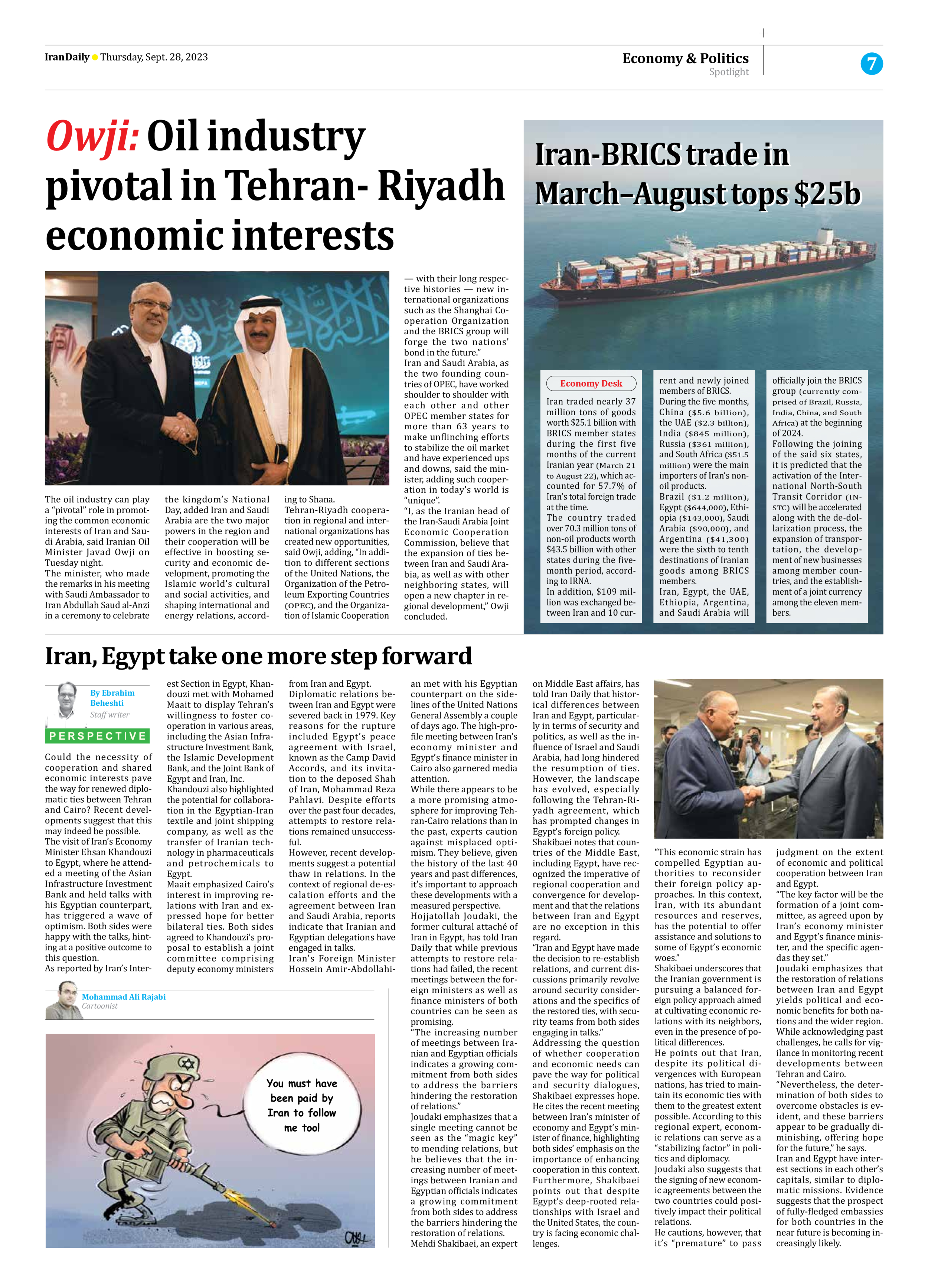
Iran, Egypt take one more step forward
By Ebrahim Beheshti
Staff writer
Could the necessity of cooperation and shared economic interests pave the way for renewed diplomatic ties between Tehran and Cairo? Recent developments suggest that this may indeed be possible.
The visit of Iran’s Economy Minister Ehsan Khandouzi to Egypt, where he attended a meeting of the Asian Infrastructure Investment Bank and held talks with his Egyptian counterpart, has triggered a wave of optimism. Both sides were happy with the talks, hinting at a positive outcome to this question.
As reported by Iran’s Interest Section in Egypt, Khandouzi met with Mohamed Maait to display Tehran’s willingness to foster cooperation in various areas, including the Asian Infrastructure Investment Bank, the Islamic Development Bank, and the Joint Bank of Egypt and Iran, Inc.
Khandouzi also highlighted the potential for collaboration in the Egyptian-Iran textile and joint shipping company, as well as the transfer of Iranian technology in pharmaceuticals and petrochemicals to Egypt.
Maait emphasized Cairo’s interest in improving relations with Iran and expressed hope for better bilateral ties. Both sides agreed to Khandouzi’s proposal to establish a joint committee comprising deputy economy ministers from Iran and Egypt.
Diplomatic relations between Iran and Egypt were severed back in 1979. Key reasons for the rupture included Egypt’s peace agreement with Israel, known as the Camp David Accords, and its invitation to the deposed Shah of Iran, Mohammad Reza Pahlavi. Despite efforts over the past four decades, attempts to restore relations remained unsuccessful.
However, recent developments suggest a potential thaw in relations. In the context of regional de-escalation efforts and the agreement between Iran and Saudi Arabia, reports indicate that Iranian and Egyptian delegations have engaged in talks.
Iran’s Foreign Minister Hossein Amir-Abdollahian met with his Egyptian counterpart on the sidelines of the United Nations General Assembly a couple of days ago. The high-profile meeting between Iran’s economy minister and Egypt’s finance minister in Cairo also garnered media attention.
While there appears to be a more promising atmosphere for improving Tehran-Cairo relations than in the past, experts caution against misplaced optimism. They believe, given the history of the last 40 years and past differences, it’s important to approach these developments with a measured perspective.
Hojjatollah Joudaki, the former cultural attaché of Iran in Egypt, has told Iran Daily that while previous attempts to restore relations had failed, the recent meetings between the foreign ministers as well as finance ministers of both countries can be seen as promising.
“The increasing number of meetings between Iranian and Egyptian officials indicates a growing commitment from both sides to address the barriers hindering the restoration of relations.”
Joudaki emphasizes that a single meeting cannot be seen as the “magic key” to mending relations, but he believes that the increasing number of meetings between Iranian and Egyptian officials indicates a growing commitment from both sides to address the barriers hindering the restoration of relations.
Mehdi Shakibaei, an expert on Middle East affairs, has told Iran Daily that historical differences between Iran and Egypt, particularly in terms of security and politics, as well as the influence of Israel and Saudi Arabia, had long hindered the resumption of ties. However, the landscape has evolved, especially following the Tehran-Riyadh agreement, which has prompted changes in Egypt’s foreign policy.
Shakibaei notes that countries of the Middle East, including Egypt, have recognized the imperative of regional cooperation and convergence for development and that the relations between Iran and Egypt are no exception in this regard.
“Iran and Egypt have made the decision to re-establish relations, and current discussions primarily revolve around security considerations and the specifics of the restored ties, with security teams from both sides engaging in talks.”
Addressing the question of whether cooperation and economic needs can pave the way for political and security dialogues, Shakibaei expresses hope. He cites the recent meeting between Iran’s minister of economy and Egypt’s minister of finance, highlighting both sides’ emphasis on the importance of enhancing cooperation in this context.
Furthermore, Shakibaei points out that despite Egypt’s deep-rooted relationships with Israel and the United States, the country is facing economic challenges.
“This economic strain has compelled Egyptian authorities to reconsider their foreign policy approaches. In this context, Iran, with its abundant resources and reserves, has the potential to offer assistance and solutions to some of Egypt’s economic woes.”
Shakibaei underscores that the Iranian government is pursuing a balanced foreign policy approach aimed at cultivating economic relations with its neighbors, even in the presence of political differences.
He points out that Iran, despite its political divergences with European nations, has tried to maintain its economic ties with them to the greatest extent possible. According to this regional expert, economic relations can serve as a “stabilizing factor” in politics and diplomacy.
Joudaki also suggests that the signing of new economic agreements between the two countries could positively impact their political relations.
He cautions, however, that it’s “premature” to pass judgment on the extent of economic and political cooperation between Iran and Egypt.
“The key factor will be the formation of a joint committee, as agreed upon by Iran’s economy minister and Egypt’s finance minister, and the specific agendas they set.”
Joudaki emphasizes that the restoration of relations between Iran and Egypt yields political and economic benefits for both nations and the wider region.
While acknowledging past challenges, he calls for vigilance in monitoring recent developments between Tehran and Cairo.
“Nevertheless, the determination of both sides to overcome obstacles is evident, and these barriers appear to be gradually diminishing, offering hope for the future,” he says.
Iran and Egypt have interest sections in each other’s capitals, similar to diplomatic missions. Evidence suggests that the prospect of fully-fledged embassies for both countries in the near future is becoming increasingly likely.







